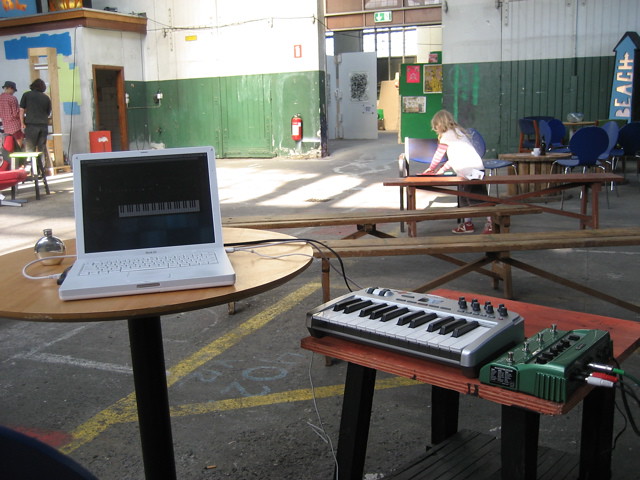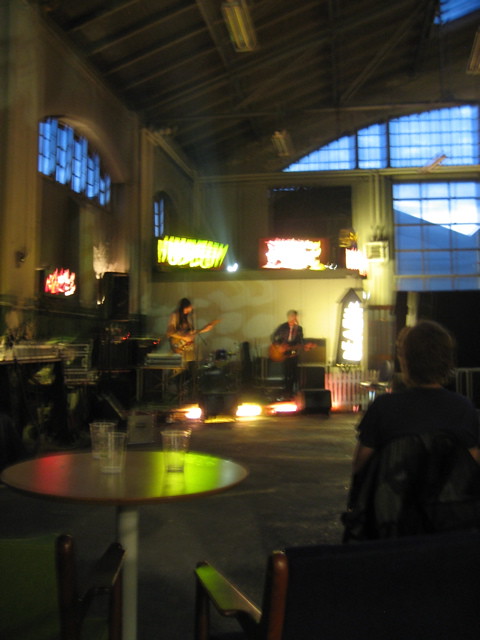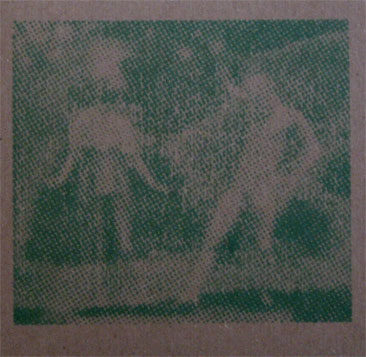Lie Low
One of the first tools I created when I combined a MIDI controller with the Oddity (an Arp Odyssey emulator made by GForce) was a set of patches of pure intervals. I did not set these intervals in any fixed intonational scheme, but took a more simple approach. I tuned the two oscillators in the Oddity using the 128 steps available in MIDI to obtain the best beatless intervals as possible. I performed the tuning entirely by ear, listening for the absence of beats while tuning a unison, octave, major second, minor and major thirds, perfect fourths and fifths, minor and major sixths, and two minor sevenths, one above and one below the tonic note.
The title "Lie Low" comes from a fragment of a folk song recorded in 1930 in Manchester Center, Vermont, by Helen Hartness Flanders. Flanders included this song in her book The New Green Mountain Songster. I found the book years ago in Brattleboro's Brooks Memorial Library. I was drawn to the fragment "Lie Low" because it is the sole entry in the volume in the Mixolydian mode. In my own performances of "Lie Low," I take the original melody, stretch it out over an extended period of time without rhythm, and place the melody over a drone. "Lie Low" is performed using the Oddity/MIDI controller. The melody's intervals, as they relate to the drone, are taken from the purely tuned intervals that I stored as patches. I then manipulate ring modulation the filter's frequency and resonance to emphasize various harmonics and difference tones in the intervals.
"Lie Low" received the heaviest editing of all the tracks on Panic and Anti-Panic. The old train yard at Engehavej at which the Festival of Endless Gratitude took place was a cavernously resonant space. Since I don't tend to like to work with high volume, I didn't play my set particularly loud. Nearly 30 minutes of music were filled with clanking bottles, dragging chairs, children laughing, and one rather loud cell phone conversation; removing these distractions reduced the track down to a little over nine minutes, so the version on Panic and Anti-Panic does not represent a complete performance.
The title "Lie Low" comes from a fragment of a folk song recorded in 1930 in Manchester Center, Vermont, by Helen Hartness Flanders. Flanders included this song in her book The New Green Mountain Songster. I found the book years ago in Brattleboro's Brooks Memorial Library. I was drawn to the fragment "Lie Low" because it is the sole entry in the volume in the Mixolydian mode. In my own performances of "Lie Low," I take the original melody, stretch it out over an extended period of time without rhythm, and place the melody over a drone. "Lie Low" is performed using the Oddity/MIDI controller. The melody's intervals, as they relate to the drone, are taken from the purely tuned intervals that I stored as patches. I then manipulate ring modulation the filter's frequency and resonance to emphasize various harmonics and difference tones in the intervals.
 |
| Soundcheck with children playing |
"Lie Low" received the heaviest editing of all the tracks on Panic and Anti-Panic. The old train yard at Engehavej at which the Festival of Endless Gratitude took place was a cavernously resonant space. Since I don't tend to like to work with high volume, I didn't play my set particularly loud. Nearly 30 minutes of music were filled with clanking bottles, dragging chairs, children laughing, and one rather loud cell phone conversation; removing these distractions reduced the track down to a little over nine minutes, so the version on Panic and Anti-Panic does not represent a complete performance.
 |
| View of the stage; Zhaeng Zhaeng performing. |
Labels: panic and anti-panic






